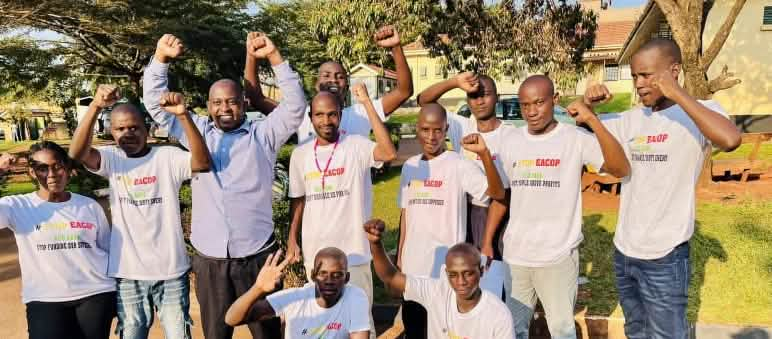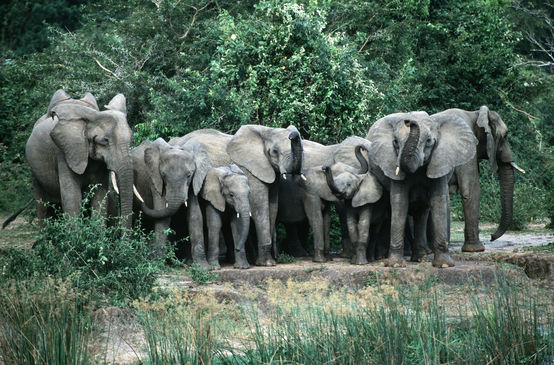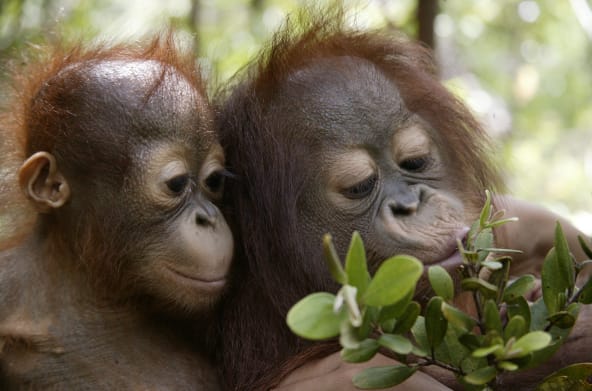
Uganda: “No to fossil fuels, yes to climate justice”
Uganda: Environmental activist Bob Baribye is fighting in Uganda for the climate and against the EACOP oil pipeline. He spent 85 days in jail for peaceful protest.
Bob Baribye and ten other activists were arrested in Kampala on April 23. They were allowed into a branch of Kenya Commercial Bank (KCB) – a potential financier of the pipeline – and reportedly lured into the basement. They apparently believed they would meet with bank representatives there to discuss their concerns about the East African Crude Oil Pipeline (EACOP). Instead, police officers were waiting for them. They were charged with trespassing. After 85 days behind bars, they were released on bail.
Those released are part of the #StopEACOP coalition, which brings together local groups, communities, and African as well as international organizations – including Rainforest Rescue.
The following interview was conducted by email:
Is Uganda already experiencing the effects of the climate crisis?
Yes, Uganda is already experiencing the harsh effects of the climate crisis. As a StopEACOP activist, I am urgently trying to address this.
Communities across the country face rising temperatures, unpredictable rainfall, prolonged droughts, floods, and landslides in the east that are causing loss of lives, destroying crops, displacing families, and deepening poverty. These climate impacts threaten food security, water access, and livelihoods especially for rural and vulnerable populations.
By opposing the East African Crude Oil Pipeline and other fossil fuel projects, we are standing up not just against environmental destruction, but for climate justice and the protection of communities already suffering the consequences of a warming planet.
We are standing against corporate greed that fuels climate justice.
What are the biggest threats in Uganda to the climate?
One of the biggest threats to Uganda’s climate, especially from EACOP and other oil projects, is the acceleration of greenhouse gas emissions, which contribute directly to the worsening climate crisis already affecting the country.
These projects involve large-scale deforestation, destruction of wetlands, and fossil fuel extraction that threaten critical ecosystems like the Murchison Falls National Park and Lake Albert region. The oil pipeline itself will run through sensitive areas, increasing the risk of oil spills, water contamination, and long-term damage to biodiversity.
These developments not only endanger the environment but also undermine Uganda’s ability to meet climate goals and protect future generations from the escalating impacts of climate change.
Is the government doing anything to protect the climate and people?
It’s clear that while the Ugandan government claims to support climate protection and sustainable development, its actions often tell a different story. By backing projects like EACOP and expanding oil exploration in ecologically sensitive areas, the government is prioritizing short-term profits over long-term environmental and human well-being.
These decisions worsen the climate crisis, threaten communities with displacement, pollute vital water sources, and destroy forests and wildlife.
Instead of investing in renewable energy and community resilience, the government continues to support fossil fuel projects that put both people and the planet at greater risk.
What responsibility does the Global North have?
I believe the international community, especially countries in the Global North, have a major responsibility in stopping harmful projects like EACOP and supporting real climate justice. Many of these countries and their banks, insurers, and investors have historically contributed the most to the climate crisis, yet continue to finance harmful fossil fuel projects in the Global South like Uganda.
This is not just hypocritical; it’s a form of environmental injustice.
The Global North must stop funding and profiting from oil projects that destroy African ecosystems and displace communities. Instead, they should support renewable energy, climate finance for adaptation, and strengthen the voices of frontline communities fighting for a livable planet.
What do you think about climate “solutions” such as carbon credits?
I do not much care for these so-called solutions like carbon credits and carbon offsets, which are of course highly often promoted by Global North countries and corporations, but I see them as distractions from real climate action. They literally allow polluters to continue emitting greenhouse gases while compensating by funding projects like tree planting or conservation.
These schemes rarely benefit local communities and do nothing to stop the root cause of the crisis, which is the continued fossil fuel extraction and emissions. Worse still, they are now being used to greenwash destructive projects like EACOP, justifying environmental harm under the false promise of offsetting.
True climate justice means ending fossil fuel expansion, not trading pollution for profit.
You spent three months in prison for your dedication. What gives you hope?
After three months in prison for peacefully protesting the funding of the EACOP project, my dedication has only grown stronger.
Prison was meant to break my spirit, but instead, it reminded me why this fight matters so deeply.
I have seen firsthand how communities are being displaced, how wildlife and ecosystems are being threatened, and how our leaders and investors continue to prioritize profit over people.
What gives me hope is the growing resistance from students, impacted communities, youth, and other networks around the world who are standing together to say no to fossil fuels and yes to climate justice.
Our voices are powerful, and no amount of intimidation can silence the truth. We are shifting opinions, it is visible.
How can Rainforest Rescue and our community stand with you?
Looking at how we got our freedom back, I know how critical global solidarity is in this struggle.
Organizations like Rainforest Rescue and its partners can play a vital role by amplifying our voices, exposing human rights abuses, and increasing international pressure on financiers and corporations backing the pipeline.
They can support grassroots movements with legal empowerment and climate awareness workshops, protection for at-risk activists, and funding for community education and organizing.
Most importantly, they can help shift the narrative globally making it clear that EACOP is not just a local issue, but a global climate and justice crisis.
Your solidarity gives us strength, and your action helps turn our hope into real impact.
This page is available in the following languages:

Uganda: keep the oil in the ground – save Murchison Falls!
Uganda sits on vast oil resources, and three multinational companies are ready to drill – in of all places, Murchison Falls National Park.

The rainforest
A green sea of ferns, mosses, vines and ancient trees. Iridescent butterflies and colorful birds. Flowers in every hue of the rainbow. The “green lung” is a natural wonder of the world. Find out more about the world’s most diverse, fascinating and threatened ecosystem.